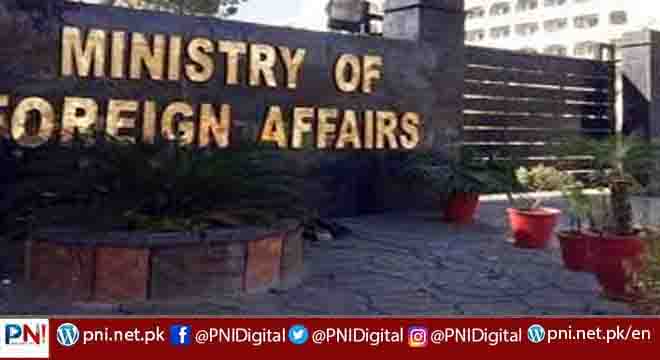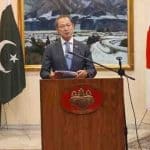ISLAMABAD, Dec 29 (APP): The removal of Pakistan from the Grey List of Financial Action Task Force, the establishment of Loss and Damage Fund at COP27, and enhanced frequency of high-level exchanges are among the major outcomes of Pakistan’s active multilateral diplomacy throughout 2022.
During the outgoing year, Pakistan continued to pursue an active multilateral diplomacy both in individual capacity and as member of international groupings, Foreign Office Spokesperson Mumtaz Zahra Baloch said in her weekly press briefing on Thursday.
“We are encouraged with the results of our diplomatic efforts in multilateral settings, the most important of which was Pakistan’s success in coming out of the FATF Grey List in October 2022. Another important achievement was the establishment of Fund for Loss and Damage at COP27 for developing countries,” the spokesperson told media while giving a roundup of the major diplomatic during the year.
She said 2022 was an active year for Pakistan’s diplomacy as the country followed a policy of enhanced engagements with its close partners and friends. The diplomatic efforts were aimed at enhancing Pakistan’s international profile and revitalizing its external relations while protecting national interests.
Throughout the year, there was enhanced frequency of high-level exchanges with Pakistan’s friends and partners, including increased in-person meetings and interactions as the world moved out of the COVID-related restrictions, she remarked.
The spokesperson mentioned that during the year, former prime minister visited China and Russia while the former foreign minister also undertook visits to Romania and Spain.
Moreover, she added, Prime Minister Shehbaz Sharif and Foreign Minister Bilawal Bhutto Zardari visited countries in Asia and Europe, and to the United States.
High-level visits exchanged with Afghanistan, Austria, China, Cambodia, Ethiopia, Germany, Iran, Indonesia, Kazakhstan, Qatar, Saudi Arabia, Singapore, Turkey, Tajikistan, Togo, the United Arab Emirates, the United States and Uzbekistan helped develop important understandings with those countries, she added.
She also apprised the media of the visits of United Nations Secretary-General, Secretary General of Organisation of Islamic Cooperation (OIC), Secretary General of Shanghai Cooperation Organization (SCO) and UN High Commissioner for Human Rights to Pakistan which contributed to enhanced cooperation between Pakistan and those organizations.
The spokesperson said Pakistan reinforced its traditional partnerships with China, Türkiye, Saudi Arabia and the Islamic world.
“These relationships are based on mutual trust and friendship and characterized by a tradition of robust dialogue and exchange of bilateral visits. There was a revival and rejuvenation of political and sectoral dialogues with all partners through high-level engagements, which allowed institutionalization of relationships.”
Moreover, the spokesperson said, during the last year, Pakistan held bilateral dialogue mechanisms with Argentina, Ethiopia, the European Union, Hungary, Indonesia, Kyrgyz Republic, Luxembourg, Malta, Mexico, Netherlands, Saudi Arabia, Singapore, Türkiye, and Uzbekistan. It also included the first ever dialogue with Luxembourg.
She said during the outgoing year, Pakistan saw a positive momentum in relations with the United States, especially with the visits of the foreign minister in September and December. Besides, a Senate-confirmed ambassador was appointed by the US to Pakistan after four years.
Moreover, the US agreed to Pakistan’s long-standing request for provision of military hardware, she added and expressed the confidence that de-hyphenation of relations would further contribute to strengthening of their bilateral relations.
She said Pakistan’s focus was to develop deeper economic collaboration, cooperate to confront climate change, and find opportunities in higher education and employment.
The spokesperson said Pakistan’s relations with Africa were seeing a positive trend in terms of bilateral trade and political, parliamentary, military and security cooperation. Similarly, the remittances from Africa had reached a high of over $400 million.
Regarding Afghanistan, she said since August 15, 2021, Pakistan pursued continuous and practical engagement with the interim Afghan government and mentioned the meeting of Foreign Minister Bilawal Bhutto Zardari with Acting Foreign Minister of Afghanistan Mawlawi Amir Khan Muttaqi on the sidelines of the SCO-CFM in Tashkent and the visit of Minister of State for Foreign Affairs Hina Rabbani Khar to Kabul in November.
Referring to an attack on Pakistan’s Head of Mission in Kabul, the spokesperson said the security of Pakistan’s diplomats and missions in Afghanistan had been increased.
She expressed disappointment over the Afghan Interim Government’s decision about women education and their participation in public life in Afghanistan.
The spokesperson thanked all the countries and international organizations that came forward with humanitarian assistance after the disastrous floods including Belgium, China, Denmark, the European Union, France, Germany, Greece, Indonesia, Italy, Iran, Jordan, Malaysia, Nepal, Oman, Palestine, Qatar, Russia, Saudi Arabia, Singapore, Tajikistan, Türkiye, Turkmenistan, the UAE, the UK, the US, Uzbekistan, ADB, UNICEF, UNHCR, World Bank and WFP.
This year, she said, Pakistan was leading two important groupings – OIC CFM and G77 and China – the largest international grouping of developing countries. Pakistan also hosted the 48th OIC Ministerial Conference in Islamabad on March 22-23, 2022 that brought together OIC members and observers at senior levels. Twenty-four foreign ministers attended the CFM.
Moreover, she said, Pakistan was removed from the FATF Grey List after 52 months of rigorous scrutiny.
“Pakistan’s removal from the grey list marked completion of two very challenging and complicated action plans and a high degree of effectiveness of our Money Laundering and Countering Financing of Terrorism (AML/CFT) regime, which is irreversible and robust.”
In case of India, the spokesperson said, Pakistan consistently maintained that bilateral relations could not fully normalize until the resolution of the outstanding disputes, especially the core issue of Jammu and Kashmir.
However, she added, a Hindutva inspired nationalist government continued to act as a regional bully and create hurdles in development of normal bilateral relations. Its suppression of minorities and the people of IIOJK (Indian Illegally Occupied Jammu & Kashmir) was a matter of great concern for Pakistan.
She said Pakistan recently released a dossier on the Indian involvement in the Lahore attack in June last year and also invited the international community’s attention towards the Indian involvement in terrorism directed against Pakistan.
The year, she added, also witnessed the incident of firing of an Indian supersonic missile into Pakistani territory on 9th March 2022. The incident revealed technical lapses and systemic loopholes of serious nature in India’s handling of its strategic weapons.
During 2022, she said, India continued to use its military might to suppress the Kashmiris’ struggle for their rights and liberty.
“Pakistan will continue to make all possible efforts for the settlement of Jammu and Kashmir dispute in accordance with the relevant UN Security Council resolutions,” the spokesperson resolved.
Follow the PNI Facebook page for the latest news and updates.









